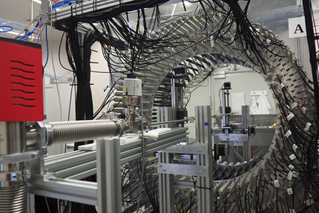Scientific supervisor
| Name | Dr. Sharma Sushil, mgr Deepak Kumar |
| Email: | sushi.sharma@uj.edu.pl, deepak.kumar2014@gmail.com |
| Department | Experimental Particle Physics and Applications |
| Laboratory | J-PET |
| Group webpage | http://koza.if.uj.edu.pl/ |
Short description
The aim of the research is to measure and analyze whether the γ quanta resulting from the decay of the positronium atom are quantum entangled (i.e. whether they are related to each other at a distance). The positronium atom consisting of an electron and a positron (the antiparticle of an electron that is formed as a result of β+ decay) decays after some time, emitting photons as a result of positron annihilation with a bound electron or other electron from the environment.
During the internship, the student will have the opportunity to acquire knowledge about the conducted research (theoretical basis, statistics), learn about the J-PET detection system unique in the world (Fig. 1) (learning how to use the device, conduct measurements), and then perform the experiment prepared by him. in which the emission of photons from the decay of positronium will be studied. The collected data will then be analyzed for the study of quantum entanglement

The level of research will be adapted to the degree of study. Each step of the experimental work and data analysis will be explained on an ongoing basis and according to individual needs.
Main research tools
- J-PET detector
- oscilloscope
- C++/python
- ROOT library
Additional requirements to the candidate
- Students of physics, experimental physics and particle physics.
- Nice to have: willingness to learn, research enthusiasm, diligence and punctuality.
Possibility to continue student internship in the form of:
- Diploma thesis (master's or bachelor's degree): Yes
- PhD study: Yes

